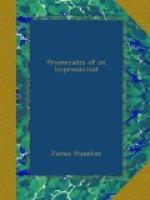Mauclair does not like the coupling of Watteau’s name with those of Boucher, Pater, Lancret, De Troy, Coypel, or Vanloo. They imitated him as to externals; the spirit of him they could not ensnare. If Watteau stemmed artistically from Rubens, from Ruysdael, from Titian (or Tiepolo, as Kenyon Cox acutely hints) he is the father of a great school, the true French school, though his stock is Flemish. Turner knew him; so did Bonington. Delacroix understood him. So did Chardin, himself a solitary in his century. Without Watteau’s initiative Monticelli might not be the Monticelli we know, while Claude Monet, Manet, Renoir are the genuine flowering of his experiments in the division of tones and the composition of luminous skies.
Mauclair smiles at Caylus for speaking of Watteau’s mannerisms, the mannerisms that proclaim his originality. Only your academic, colourless painter lacks personal style and always paints like somebody he is not. Watteau’s art is peculiarly personal. Its peculiarity—apart from its brilliancy and vivacity—is, as Mauclair remarks, “the contrast of cheerful colour and morbid expression.” Morbidezza is the precise phrase; morbidezza may be found in Chopin’s art, in the very feverish moments when he seems brimming over with high spirits. Watteau was not a consumptive of the Pole’s type. He did not alternate between ecstasy and languor. He was cold, self-contained, suspicious, and inveterately hid the state of his health. He might have been cured, but he never reached Italy, and that far-off dream and his longing to realise it may have been the basis of his last manner—those excursions into a gorgeous dreamland. He yearned for an impossible region. His visions on canvas are the shadowy sketches of this secret desire that burned him up. It may have been consumption—and Mauclair makes out a strong case—and it may have been the expression of a rare poetic temperament. Watteau was a poet of excessive sensibility as well as the contriver of dainty masques and ballets.
In literature one man at least has understood him, Walter Pater. Readers of his Imaginary Portraits need not be reminded of A Prince of Court Painters, that imaginative reconstruction of an almost obscure personality. “His words as he spoke of them [the paintings of Rubens] seemed full of a kind of rich sunset with some moving glory within it.” This was the Watteau who is summed by Pater (a distant kinsman, perhaps, of the Pater Watteau tutored) as a man who had been “a sick man all his life. He was always a seeker after something in the world, that is there in no satisfying measure, or not at all.” Camille Mauclair eloquently ends his study with the confession that the mere utterance of Watteau’s name “suffices to evoke in men’s minds a memory of the melancholy that was his, arrayed in garments of azure and rose. Ah! crepuscular Psyche, whose smile is akin to tears!”




